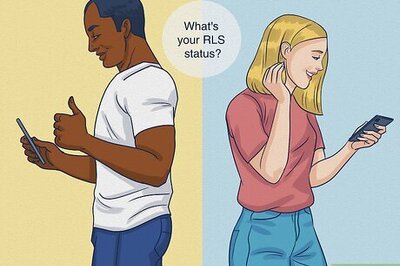
views
Using Memorization Tricks

Make a mnemonic device to help you remember. Mnemonic devices help make information easier to remember. Create a rhyming song out of the information, or assign an acronym that you won’t forget. This works great with locker combinations, passwords, PINs, and chronological information. If you set the information that you need to know to a catchy tune, it’ll be easier to remember it. Try out nursery rhymes or pop songs to get the information stuck in your head. Common Mnemonic Devices ROY G BIV stands for the colors of the rainbow. Please Excuse My Dear Aunt Sally (PEMDAS) represents the order of operations for math equations. Every Good Boy Does Fine helps people to remember the pitches associated with the 5 lines of the treble clef in music.

Write or say the information repeatedly to remember it. Writing and speaking are very helpful for remembering information. Try writing down a new phone number or address 20 times when you want to memorize it. Then, turn the paper over and recite the number or address out loud 20 more times. If you don't have a pen or paper, try saying the information out loud to another person, which can also help you remember. Some people can also benefit from reading the information out loud as they write it. This will help your brain to “access” the information, making it easier to recall when you need it. If writing the information 20 times doesn't help, try 50 or 100 times. It might be time consuming, but it's worth the effort if the information is important.

Ask yourself questions about the information. If you’re trying to remember something that you read in a book or article, quiz yourself after you finish a section. Go over the most important information, the main points, and some of the specific information, like statistics, that you read. This is a helpful technique for studying for a test or exam. You can even write up mini-quizzes as soon as you finish reading, and then take them a few hours later to see what you remember.

Create a memory palace to remember a list of information. Close your eyes and imagine yourself walking through a place that you’re familiar with, like your house, bedroom, or office. As you’re walking, look around and visualize the items that you need to remember in various places, and come up with a funny or crazy story about why they’re there. Keep going until you’ve included all of the information that you need. If you have trouble recalling your grocery list or other lists of a lot of information, a memory palace can be extremely helpful. For instance, if you need to remember to get toilet paper, milk, and eggs at the grocery store, you can imagine your office covered in toilet paper because your boss went crazy and threw it there. Then, when you go sit in your desk chair, you sit on a carton of eggs and your boss pours a glass of milk on your head!

Link the information to a bizarre or funny made-up story. It’s much easier for people to remember something when there’s a feeling or emotion associated with the memory. Visualize a very vivid funny story about the thing that you need to remember. Make sure you think of every detail, and imagine yourself doing something funny or crazy. For instance, if you need to remember to pick up cake for your friend’s birthday party, you can visualize how funny it would be to push their face into the cake when they blow out their candles! Make the made up story as vivid as possible so you don’t forget it.

Position sticky notes with the information where you can easily see them. Think about some places where you go everyday, like your kitchen, bathroom, and bedroom. Write down the task, date, or information that you need to remember on a sticky note, and then place it somewhere you’ll definitely see it. For example, if you always make a cup of coffee before you leave the house, you can place a sticky note reminder on the “on” button of the machine so that you can’t make your coffee until you look at the note.

Associate the information with another memory in your mind. When you learn something new, try to link it to an established memory in your mind. If it’s a name, think of someone else you know with that name. If you don’t know anyone with that name, make a note of something distinctive about their appearance, like their hair color, and link the name to their appearance. For example, if you meet someone named Rebecca, and she has red glasses, you can remember her name by associating Rebecca with red glasses in your mind.

Practice remembering things with apps and games. Websites and apps, like MemRise and Anki, have games that help you practice remembering information, tasks, and images. Some games will challenge you to remember the order of chronological events, and others will test your abilities to remember pictures or patterns. Play with these every day to help “exercise” your brain and keep it sharp with their techniques. If you do begin to use these apps, remember to do it every day or you won’t notice much of a difference in your memorization abilities.
Setting Reminders

Write down information in a notebook or planner that you carry with you. Keep important dates in a calendar or planner that you can access at any time. Make sure you keep your planner organized, and check ahead during the week to see upcoming dates and activities. You can also use a plain notebook as a planner by converting it into a bullet journal.Tip: You can color code your to-do lists so you know where each task takes place. For example, you can write chores at home in red, schoolwork in green, and errands in blue.

Set a reminder on your phone for an important date. Use the calendar function on your phone to remind you about an event or appointment. Set the reminder for a few hours or days before the date so you don’t forget. Then, all you have to do is remember to carry your phone with you! Sometimes things like email programs will have a calendar that you can mark important dates in, like birthdays. Some will send you an email notice within 10 days of the birthday so you can remember to get a present or make reservations. You can even make a little “notice board” for sticky notes to hang in your kitchen, office, or bedroom, and you can make a habit of looking at it every day.

Ask your friends or family to remind you of the matter. If you know you’re likely to forget something important, like watering your plants or grabbing your keys before you leave the house, ask whoever is with you to remind you. Saying the task out loud will help you remember, and they might be more likely to remember. For example, if you have a friend’s birthday coming up, you might ask a different friend to text you a reminder when they buy their gift so you can remember to buy yours.

Address the matter or set another reminder as soon as you remember it. When you get a reminder or remember to do something, try to accomplish the task immediately when you think about it. If you can’t do it right away, set another reminder for a time when you know you’ll be free to do it. For instance, if you set a reminder to tell you to put a book in your backpack, move the book to your backpack as soon as you see the reminder.

Take a picture so you remember what you did. After you complete a task, you might have trouble remembering if you did it or not. Use your phone to snap a quick picture, and when you start to question yourself later, check your photos to see if you did it already. If it isn’t in your photos, you’ll know that you didn't do it. This is especially helpful for daily tasks, like closing the garage door or locking the front door. You can make a habit to delete these photos at the end of the day so your photo roll isn’t cluttered.

Make a back-up plan in case you do forget. When the task or information is so vital that something bad could happen if you forget, organize a back-up plan in case you do. Plan for the worst-case scenario, and use the buddy system to hold you accountable. For extremely vital tasks, set many reminders and use the buddy system to remind you to do it. For example, if you’re in charge of buying concert tickets for a group of 4 people, but you forget to wake up early enough and they sell out, you should have a back-up plan in place. In this case, your back-up plan could be buying the tickets secondhand on a re-selling website.



















Comments
0 comment